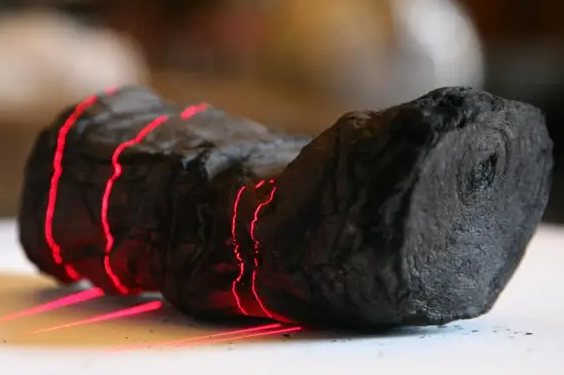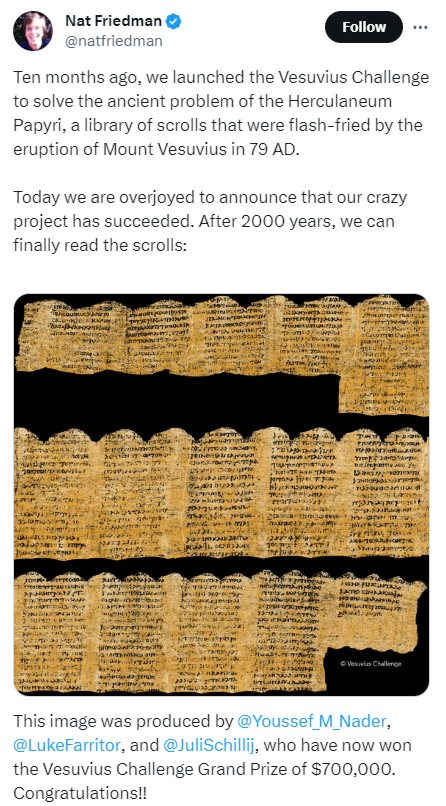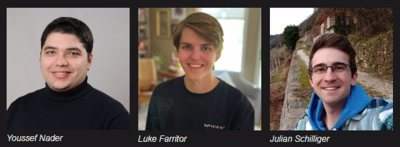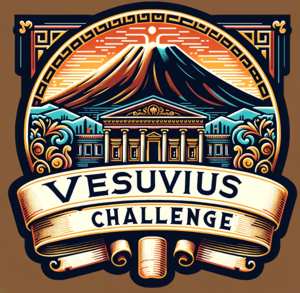| Success For Vesuvius Challenge |
| Written by Sue Gee |
| Sunday, 11 February 2024 |
|
The Vesuvius Challenge has ended with $700,000 awarded to a trio of students who successfully deciphered text on a physically impenetrable 2,000-year-old papyrus scroll that had been buried under mud and ash during the volcanic eruption that engulfed Herculaneum in 79 AD. My first report on the Vesuvius Challenge asked Can ML Unlock The Secrets of the Herculaneum Scrolls? and now we have the answer - yes it can. Having demonstrated the possibility, the next challenge is to read at least 90% of four more scrolls. Nat Friedman, former CEO of GitHub who had become obsessed with the scrolls during the 2020 Covid lockdown originally announced the Vesuvius Challenge with a post on Twitter. He used the same channel, now X, to communicate its success:
As outlined at the outset of the challenge, submissions were required in the form of images of the virtual unrolled papyrus, showing visible and legible text together with a detailed technical description of how the solution works before the deadline of 31st December, 2023. The original challenge specified "four passages" of text and the winning submission was of more, fifteen columns from the very end of the first scroll. No-one had any idea in advance what the text would concern but it turns out to be delightful musings on music, food, and how to enjoy life's pleasures, probably authored by the Epicurean philosopher Philodemus. The winning team comprised Luke Farritor, a student at the University of Nebraska-Lincoln, Youssef Nader, an Egyptian PhD student in Berlin, and Julian Schilliger, a Swiss robotics student in Zurich. The three had never met in person, but they had all won prizes awarded for achieving specific goals earlier in the contest. As detailed in Exciting Progress In Vesuvius Challenge Farritor and Nader had succeeded, independently of each other, of reading the very first text while Schilliger won three Segmentation Tooling prizes for enabling 3D mapping of the papyrus. Combining their talents for the Grand Prize their submission was considered the most readable. It contained results from three different model architectures, each supporting the findings of the others and used the strongest auto-segmentation approach. Devised by Schilliger and called ThaumatoAnakalyptor (roughly: Miracle Uncoverer), it generates massive papyrus segments from multiple scrolls. The winning submission, including code, is on GitHub as are the submissions from three runners up - Shao-Qian Mah; Louis Schlessinger and Arefeh Sherafati; and a 9-person team lead by Elian Rafael Dal Prá, each winning $50,000. While the 2023 Vesuvius Challenge is over, the idea of using competition to go further continues. According to Nat Friedman: In 2024, our goal is to [go] from reading a few passages of text to entire scrolls, and we're announcing a new $100,000 grand prize for the first team that is able to read at least 90% of all four scrolls that we have scanned. Following that the founders of Vesuvius Challenge hope they’ll be able to crack open and read the entirety of all 800 scrolls that have been retrieved to date over the next few years. Moreover, as the villa where the scrolls were found was only partially excavated, their hope is that the success of the Vesuvius Challenge catalyzes further archaeological effort and that the main library is discovered. As Garrett Ryan noted in the history section Vesuvius Challenge site: "That library, with its thousands or even tens of thousands of scrolls, must still be buried. If those texts are discovered, and if even a small fraction can still be read, they will transform our knowledge of classical life and literature on a scale not seen since the Renaissance.” It is remarkable what machine learning can do and so often unexpected.
More InformationRelated ArticlesExciting Progress In Vesuvius Challenge Vesuvius Challenge - Progress and Prizes Can ML Unlock The Secrets of the Herculaneum Scrolls?
|
| Last Updated ( Sunday, 02 February 2025 ) |




